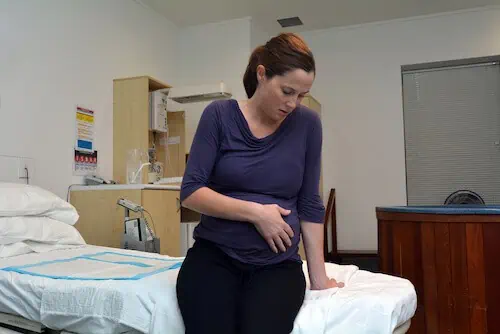I’m always asked about my birthing experiences, which is a normal conversation among women. It’s fun to swap our war stories, isn’t it? Also, I’m happy to share to help new mamas prepare for labor, delivery, birth, and all the stuff that comes after that.
Interestingly, labor commonly starts at night. Though I will tell you, this is only sometimes the case. But it is more common. I’ll show you what I mean in just a moment.
My firstborn decided to break my water all over my favorite maternity pants in the middle of the day. I was just sitting in a chair, not doing anything strenuous, when this explosion of water splashed out and made me wonder if I’d peed myself.
But my youngest one definitely followed the nighttime labor laws. I’ll share more of that one below, but let me answer your pressing questions.
- Labor often starts at night due to the melatonin coming into the picture with your other hormones.
- If you want to keep labor progressing, dim those hospital lights.
- And if you want to slow things down, make sure the room is bright!
What time of day does labor usually start?
Laboring at night is one of the most common times of day for this process to begin. Interestingly, contractions usually become most intense between 8:30 pm and 2 am. The actual labor will most often start between 12 am and 5 am.
The studies on this are fascinating, which is why I’m providing this clinical trial where they are looking more at melatonin to discover why this happens. It goes on to explain how failed labor inductions result in c-sections and how 40% of first-time mothers fail at achieving a vaginal birth. That’s why melatonin is front and center in this study.
And curiously, many women, myself included, have delivered in the hospital. You know, the place with those harsh, unforgiving lights. It seems those same lights may be impeding your uterine contractions.
What’s the relationship between your uterus and melatonin?
Well, the brain produces melatonin at night to assist your sleep-wake cycle, but it also rises in levels in the latter half of your pregnancy.
But wait! There’s more! As you get closer to your delivery, the uterus develops melatonin receptors. Isn’t that wild? So, your uterine muscles become more sensitive to this natural chemical in the body.
It’s important to note that melatonin alone doesn’t induce labor. That’s oxytocin’s job, but when melatonin shows up, the pair unite. It’s really fascinating.
Is labor more likely to start at night?
Yes, what I’ve been driving at here is that labor is more likely to start at night. But that’s not a necessary guarantee. Just see exhibit A, my eldest child.
Squelching it could be the exposure to bright lights like the kind from screens, those pesky blue lights that we love so dearly. And, of course, those unsightly hospital lights. Those things could be lowering your melatonin levels and actually prolonging the whole ordeal.

However, there has yet to be confirmed research on this. It is merely a hypothesis that begs to answer. It seems related, but I cannot affirm that without scientific evidence.
You could dim the lights in the hospital room or bring your own mood lighting if they permit it and see if that helps move things along. It’s worth a shot, but before you pack a bag full of cozy portable lighting, please check with your doctor and your hospital to see if it’s allowed.
Why does labor usually start at night?
As I mentioned, the combination of melatonin and oxytocin works in harmony and makes the magic happen. Since melatonin reaches its peak when the sun goes down, it may hold the key to why so many women go into labor at night.
Will contractions wake you up?
They certainly could! And this I know from first-hand experience.
When I was at the end of my pregnancy with my youngest, I remember waking in night to go pee. This was nothing unusual, of course, and something I’d resigned myself to dealing with when I signed up for mama life.
Exhausted, I climbed back into bed and fell back asleep. And then I woke up because of OUCH! It was a contraction, though I wasn’t sure if it was Braxton Hicks or the real thing. I made a note of the time, then drifted back to sleep. 15 minutes later, BAM! Another one.
I know because I looked at the clock again.
And so this continued in 15-minute intervals, gradually becoming closer together over the next few hours. I knew it was labor, but I was not budging. It was after midnight, and there was no way I was staying in that Chinese hospital any longer than I had to. I knew they’d put me in those hard-as-rocks beds (are hospital beds here hard? I do not know myself!) and tell me to rest until it was time to go to the OR for the planned c-section.
I took my sweet time and slept as much as possible for such intermittent annoyances, and in the morning, when my husband got up to use the bathroom, I casually mentioned we should have his parents watch our eldest while he took me to the hospital.
Then I took a nice shower and enjoyed the feeling of being clean because I knew it would be several days before I’d get that chance again.
So, in my long and winding way, yes, contractions will wake you up. Do not worry because you will not sleep through them. And don’t rush or make yourself nuts. Try to stay calm and time them out. If they’re 15 minutes apart like mine were, this will be going on for a while.
Of course, if they’re closer together than that, get a move on and get ready for show time!
Leslie Berry lives with her husband and two young daughters in Los Altos, California, where she loves helping other moms get comfortable with motherhood and embracing the insanity with facts peppered with laughs.
She loves eating too much sushi, exercising, and jamming out on her Fender. Read more about Leslie here.






